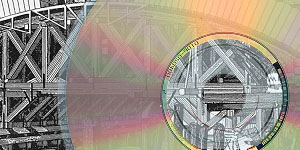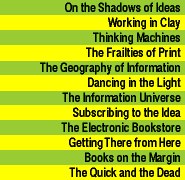


Getting There from Here
Some publishers will probably fight rather than switch. They may protest the new technology and push for laws against copying or for a legally enforced standard electronic book display that tries to keep book production or book copying out of our hands. It is easy to predict that because that's exactly what music, software, television, and movie producers each tried to do when cheap copying technology first entered their industries. Movie producers, for example, initially thought the videocassette recorder would destroy their business. Today, they can't live without its income. In America alone four thousand million videotapes a year are produced.Fifteenth-century scribes and eighteenth-century weavers tried the same resistance tactics when their ways of life were invaded by machines. Today some military pilots are fighting a similar war against the computer's incursion into the cockpit. Successful people in every field usually resist change---it might, after all, be for the worse. Nonetheless, such publishers' efforts will eventually fail, just as those earlier attempts failed. Paper books are a flawed and expensive technology, and copy-protecting electronic books is a bad idea in the long run. Do we weep because pocket calculators wiped out the slide rule industry? Or that polio vaccines destroyed the iron lung industry?
From a standing start in 1984, compact discs overtook phonograph records in just five years. Paper books will take far longer to die, partly because of inertia, but mostly because cheap, sturdy, portable, high-quality displays aren't here yet. But it's inevitable. Computer technology usually halves in price roughly every year-and-a-half to two years; at that rate, good displays will be thirty times cheaper in seven to ten years. In fifteen to twenty years they'll be a thousand times cheaper. So two decades from now paper books may be the phonograph records of their time. They'll exist for historical, sentimental, or ceremonial reasons. And for the wealthy, they'll still make perfectly good furniture. But eventually they'll go the way of the vacuum tube, which, legend tells us, existed in the 1940s and 1950s.
In advanced countries today, those thirty and under have no special interest in paper technology. They're more familiar with television and computer screens than with paper books and newspapers. By 1996, they have had Pac-Man for fifteen years, MTV for seventeen, Apple Computer for nineteen, and Sesame Street for twenty-seven. Americans alone have over thirty million personal computers and more than thirty million video-game machines in their homes. Over 70 percent of all American homes with a child between eight and twelve have a Nintendo machine. More than 95 percent of all American high schools have computers. Total sales of personal computers have exceeded a hundred million, with sixteen more million to be added in 1996. The U.S. Department of Commerce estimates that a third of all American three-year-olds have already used a computer. Today's generation talks about computers the way their parents did about cars---or drugs. Their first instinct usually isn't to reach for a paper book.